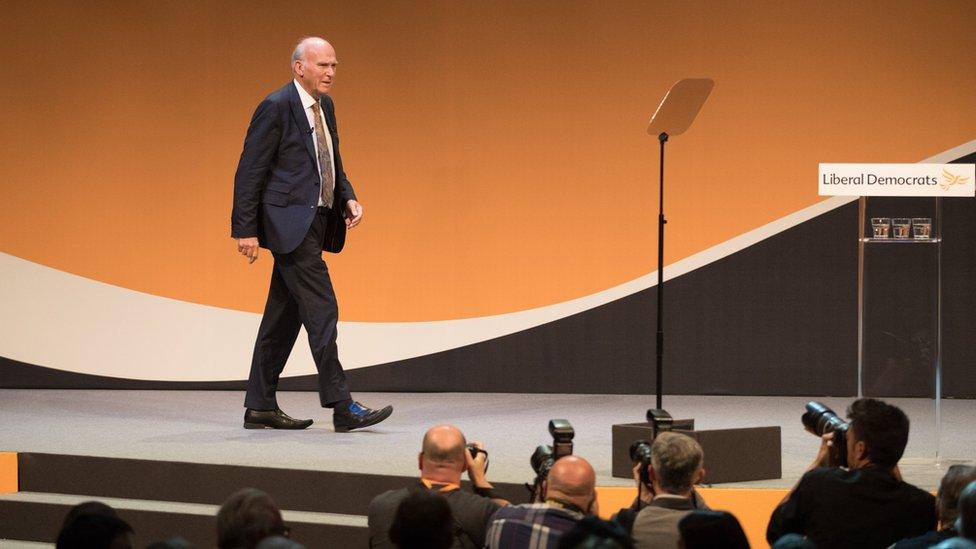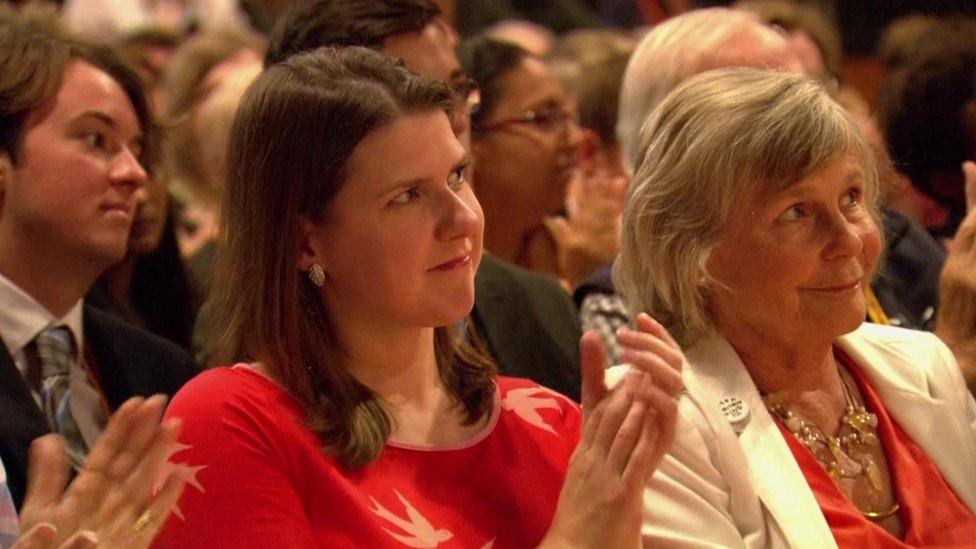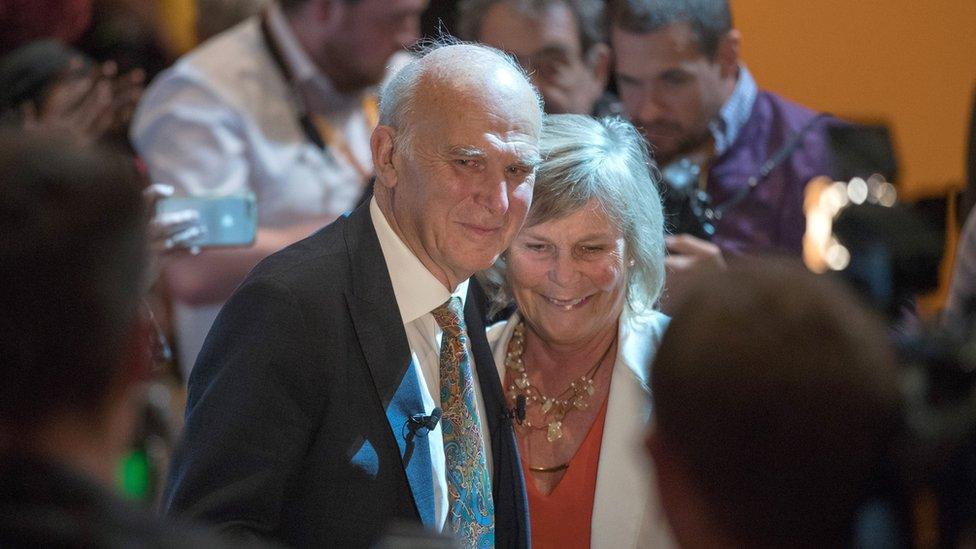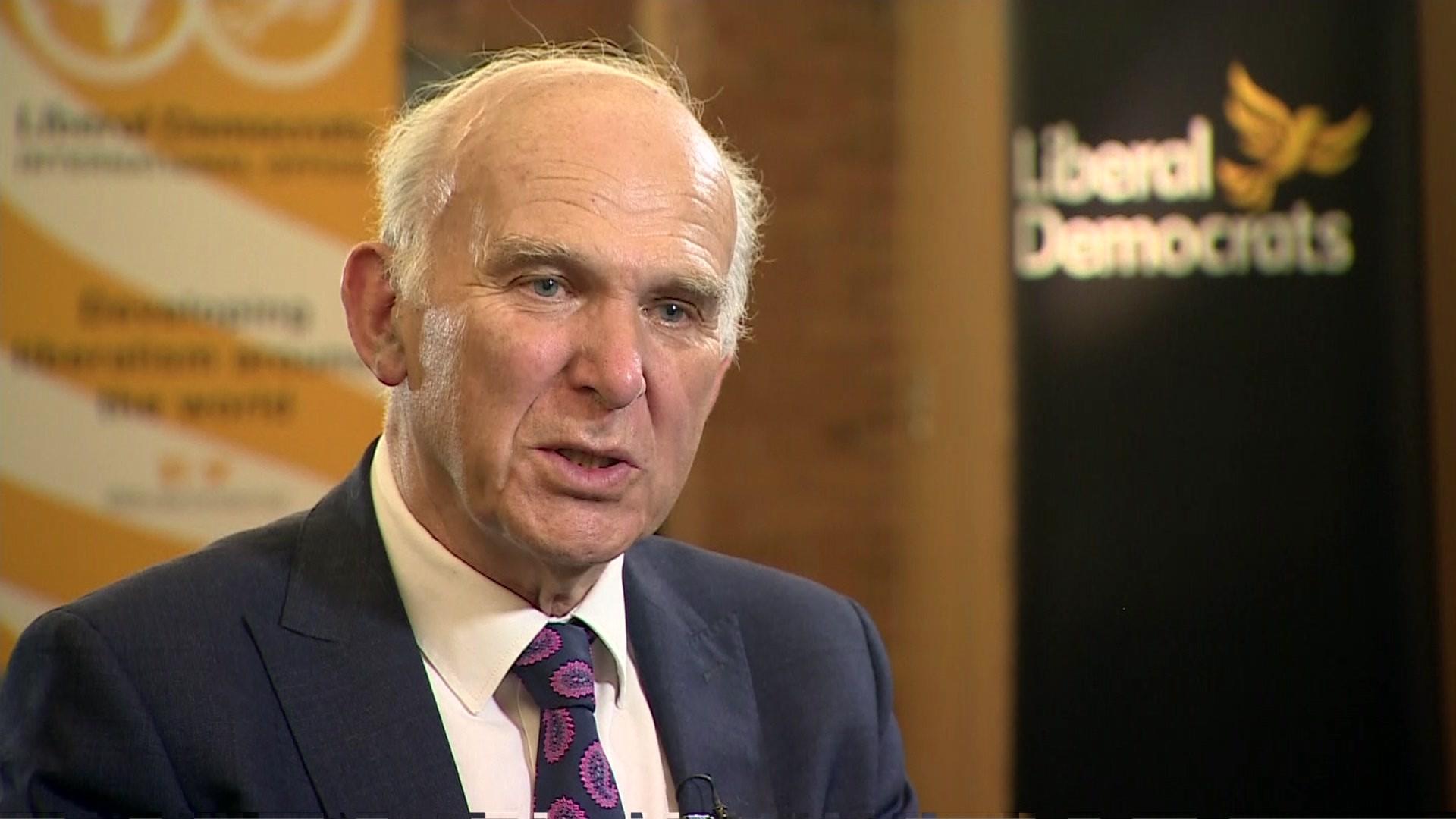Vince Cable: I can lead Lib Dems back to power
- Published
- comments
Vince Cable: "I ask you to join me on the journey as we, together, take the Liberal Democrats back to government"
Sir Vince Cable has said he can lead the Liberal Democrats back to power by offering a mix of "hope and realism".
In his first conference speech as leader, he said he was "impatient for success" and had the vision and "grown-up" approach to "fill a huge gap in the centre of British politics".
He called for higher taxes on foreign property speculators and second home owners to help tackle inequality.
And he claimed Brexit would be an act of "masochism", leaving the UK poorer.
The Lib Dems, he told activists in Bournemouth, were the "only real, undiluted pro-European" party in the country as he attacked the government's handling of the Brexit negotiations and what he said was Labour equivocation over whether to stay in the single market and customs union.
He said his party must not be solely defined by their opposition to Brexit - but he repeated his call for the public to have the final say on whether the UK actually leaves or not through a further referendum.
The 74-year old, who succeeded Tim Farron after June's general election, said the Lib Dems "did a lot of good and stopped a lot of bad" in their five years in coalition government with the Conservatives.
But the party - which increased its MPs from eight to 12 in June, but saw its vote share go down - had paid a "very high political price".
"Trust was lost," he said. "For many voters, we still have to scrub ourselves hard to get rid of the smell of clearing up other people's mess."

'Huge challenge'
By the BBC's Eleanor Garnier in Bournemouth

It was what you might call serious and sensible. Firmly fixed behind the lectern, Vince Cable drew a sharp contrast with his predecessor, Tim Farron, who would bound around the stage, bubbling with energy.
He had no problem winning applause from the faithful Lib Dem audience but whether his first conference speech as leader will punch through to the wider electorate is another question.
This was not a policy-rich speech but an attempt to set out broad ambitions, the principles behind the way Sir Vince wants the Lib Dems to grapple with the biggest issues the country faces. The Lib Dems look to him as a heavyweight politician, a former business secretary and one of the few to predict the financial crash.
But leading the Lib Dems is a huge challenge. He needs to persuade voters of the party's stance on Brexit, improve on the disappointing general election result and make the party relevant in British politics once again.

But he insisted the Lib Dems must see their future as a party of government again, with radical solutions to what he said were the main challenges facing the UK, including "deeply corrosive" inter-generational inequality, low economic productivity, skills shortages and the cost of living and housing for young people.
On tuition fees, he said levels of student debt were a source of "real concern" and the party was ready to consider all options to improve the current system, including a graduate tax, in a wide-ranging review.
Barriers to young people getting on the housing ladder must be removed, he said, with councils being able to borrow to build affordable homes and private sector investment in new garden cities.
And he vowed to end the "stranglehold of oligarchs and speculators in our housing market," with "fierce tax penalties on the acquisition of property for investment purposes, by overseas residents".

Deputy leader Jo Swinson applauds Sir Vince's speech

The Lib Dem leader left the auditorium with his wife Rachel
Drawing on his parents' experience of going to night school after work to improve their prospects, he said all young people should be given an endowment or learning account to fund further studies at any stage of their lives - to be paid through the "fair taxation of wealth".
Calling for a bigger programme of investment in the railways, broadband and other infrastructure, to be funded by government borrowing, he said his party would be both pro-enterprise and pro-worker, prepared to stand up to tech giants over corporate tax avoidance.
But the former business secretary said the Lib Dems would never be a "something for nothing" party, contrasting them with Labour, for whom he suggested "budgeting was a bourgeois hobby".
He said politics was often a long game and he had learnt from personal experience - including losing his first wife to cancer and losing his seat in 2015 - that success was "often laced with setbacks" and endurance was vital.
"What the country needs is hope and realism," he added. "In a Britain increasingly dominated by extremists and ideologues, I want us to fill the huge gap in the centre of British politics."
He said the Lib Dems had been proved right in their opposition to the Iraq war and their economic warnings prior to the 2008 banking crisis and they were right to take a stand on Brexit.
It was becoming ever clearer that the UK's exit from the EU was a "looming disaster" which could leave the UK poorer and weaker, he told party activists.
"There is another word for that - masochism. It isn't illegal. I am told some people pay good money to indulge in it. But unlike masochists, the Brexit ideologues usually envisage someone else bearing the pain.
"And that pain will mainly be felt by young people who overwhelmingly voted to Remain."
He urged members of other parties to join the Lib Dems: "There are sensible grown-ups in the Conservative Party and Labour Party and the Greens. And beyond them are millions of people deeply worried about what is happening.
"We have to put aside tribal differences and work alongside like-minded people to keep the single market and customs union, essential for trade and jobs."
- Published18 September 2017
